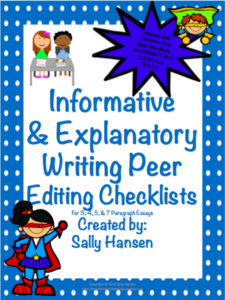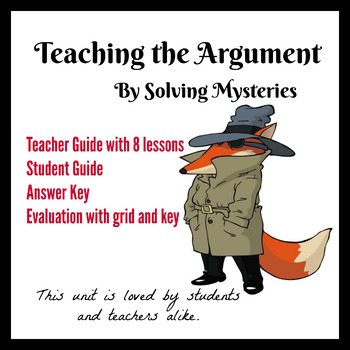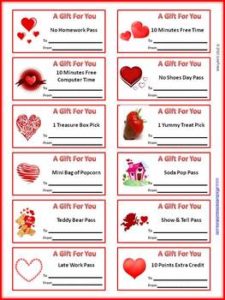Informative/Explanatory Writing Peer Editing Checklists CCSS Aligned for 3-5
Informative/Explanatory Writing Peer Editing Checklists CCSS Aligned for 3-5
The 4 peer editing checklists are very detailed (for a 3, 4, 5, & 7 paragraph essay) created for the progressing writer. Excellent for mixed or leveled classes to give students individualized instruction. Practical and easy to understand. Students will know what is expected of them and they will have opportunities to reflect on their work.
Included in this resource:
✓ How I Use This Resource
3, 4, 5, & 7 Paragraph:
✓ Peer Editing Checklist Half Page
✓ Peer Editing Checklist Full Page
✓ Terms of Use
✓ Graphics and Fonts Credit
Try part of the rubric/peer editing checklist bundle before you buy it right here…FREE Informative/Explanatory Writing Basic 3 Paragraph Rubric CCSS Aligned
*Checklists are created with variation to meet your classroom’s needs.
*Peer edits for students to share and learn from each other.
*It’s a very detailed checklist.
*For a 3, 4, 5, & 7 paragraph essay.
*Checklists are full & half page PDF format.
*Can print checklists front and back to save on paper.
*Practical and easy to understand for teachers and students.
*Great for mixed or leveled classes to give students individualized instruction.
*Add CCSS.ELA-LITERACY.W.3-5.6 by having students research the Internet and type up the essay to implement technology for a cross-curricular assignment.
*Add CCSS.ELA-LITERACY.W.3-5.7 & W.3-5.8 by having students conduct a research project by assigning a prompt. Have them gather relevant information through printed or digital sources. Be sure to have them add a bibliography.
*3-5th Grade Common Core Aligned.
*Can be used as enrichment for 2nd grade students.
The way I use this resource…
In writing, I scaffold and model information to my students. Each class is different and each year is different; therefore, I can’t do everything the same each time I teach the same subject. I start with the basic rubric and introduce 1-3 new concepts each essay. Once I introduce a concept, I hold students accountable for the concepts I taught. If it appears that the majority of the class does not understand the concept, I do not hold them accountable and I reteach the concept. I try not to stifle their creativity by focusing on spelling, capitalization, and punctuation during the first two terms of school depending on the class. I also can easily use the 6 traits of writing with the rubrics.
Additionally, depending on the class, I may start the school year off by requiring a 3 paragraph essay then work our way up to a 7 paragraph essay. Make sure you choose a topic that is relevant, relatable, and the reasons are researchable.
Next, I introduce the peer editing checklist. I have students pair up and exchange papers. I have clipboards students can use while they sit around the room for this activity. It’s important for you to model for the students how to peer edit. Many times students just want to be nice and not give feedback. However, this is a great opportunity for students to read each others essays and learn from each other. I try not to let the same students peer edit with each other every time in order for students to view a variety of styles over the school year.
Finally, you are able to print front and back! Then you can cut them in half to save on paper. For example, pages 4 and 5 are the same rubric. Simply print it from your computer or printer as two-sided. If this does not work for you, print the first rubric for a full page rubric.
Happy Teaching!
Sally



